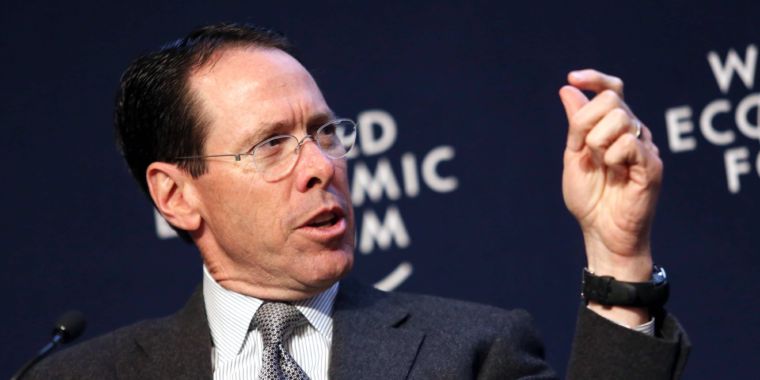
Getty Images | Bloomberg
AT&T’s CEO predicted that T-Mobile USA and Sprint will have a difficult time getting their merger approved because the deal would eliminate a major competitor.
AT&T CEO Randall Stephenson was interviewed at a Recode conference on Wednesday, and he discussed the pending T-Mobile/Sprint deal as well as AT&T’s pending acquisition of Time Warner Inc.
“I think [T-Mobile and Sprint] have a tough hill to climb, I mean, it’s a classic horizontal merger where you’re taking a competitor out of the marketplace,” Stephenson said.
AT&T tried to buy T-Mobile itself during the Obama presidency, but the company gave up after the Justice Department and Federal Communications Commission objected to the merger’s impact on competition.
The FCC is far more industry-friendly today under Chairman Ajit Pai, but DOJ antitrust chief Makan Delrahim sued AT&T in order to block its takeover of Time Warner. The case went to trial and a US District Court judge is expected to issue a ruling by June 12.
AT&T was close to getting DOJ approval of the merger before Delrahim assumed his position in September 2017.
“It was obvious that when Mr. Delrahim had been confirmed by the Senate, that we were really close to having a deal done with the DOJ, then all a sudden those talks kind of came to a grinding halt,” Stephenson said at the Recode conference.
Stephenson was asked if he thinks T-Mobile should be allowed to buy Sprint, but he declined to answer. “I’m not taking any public position,” he said. “People say, ‘Well, if he comes out and he says he supports it, that means that it must be anti-competitive. Because why would he want it? If he says that he’s against it, that means it must be pro-competitive, so we gotta let it go.’”
Verizon CEO Lowell McAdam said last month that he doesn’t care whether T-Mobile and Sprint merge. “We don’t have a point of view on whether it goes through or it doesn’t,” McAdam said, according to The Seattle Times. “We frankly don’t care.”
T-Mobile and Sprint claim that they must merge in order to create a 5G network that can compete against AT&T and Verizon, the two biggest mobile carriers in the US. But in the months before the merger was announced, T-Mobile and Sprint both said they were on track for huge 5G deployments—without any mention of needing a merger.
“Power to [T-Mobile] if they get it done”
Though Stephenson said the T-Mobile/Sprint merger will have a tough time getting approval, he said the market is more competitive today than when AT&T tried to buy T-Mobile in 2011.
“It is a very different marketplace today and there are a number of competitors out there in this space,” Stephenson said, perhaps referring to cable companies like Comcast offering mobile services in their cable territories. “A new competitor’s coming into it every day, so it will probably get a different review than what our deal with T-Mobile received. But power to them if they get it done.”
Stephenson also answered a question about AT&T’s decision to pay $600,000 to Trump lawyer Michael Cohen’s shell company, Essential Consultants, for “insight” into the Trump administration.
“I don’t have much to add, other than the statement that I put out that said, ‘what a big mistake,’” Stephenson said. “President Trump came into office, and nobody knew the guy and the staff he was putting around him, the man, and so our folks in DC had this guy approach them, and thought, ‘Well, this will be an interesting way to at least get some insight into the administration.’ Bad mistake.”
Be the first to comment